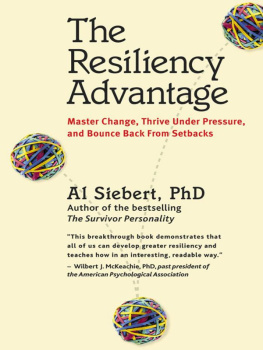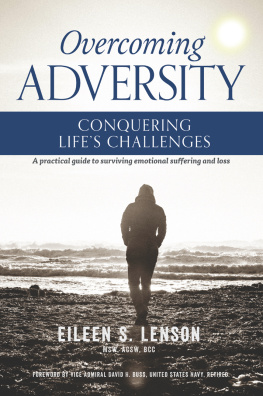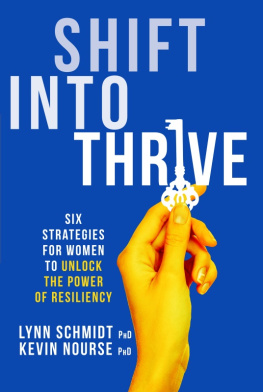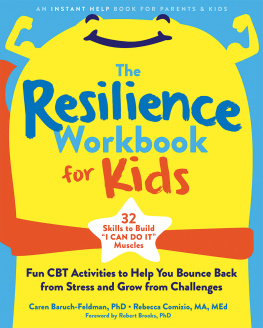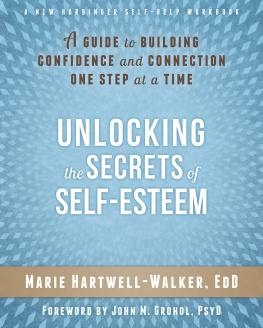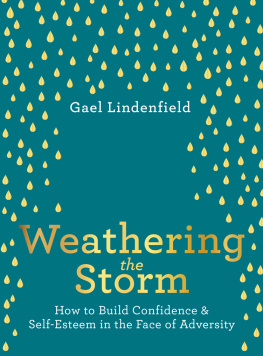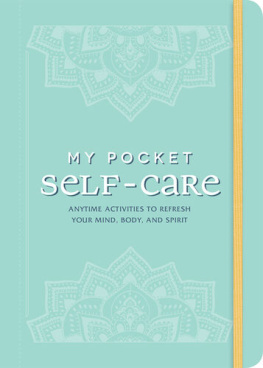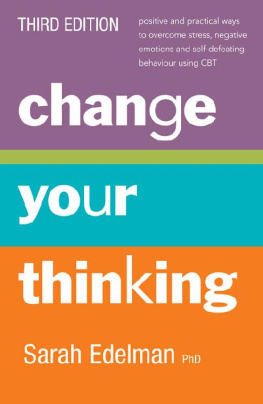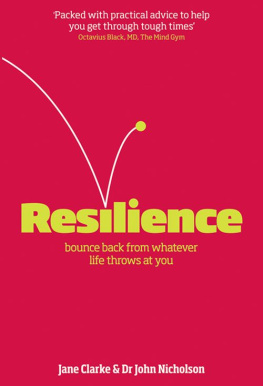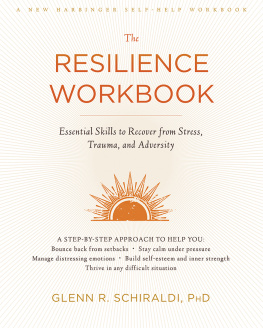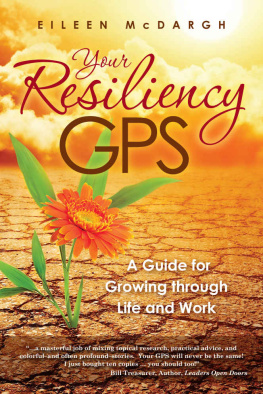also by Al Siebert:
The Adult Students Guide to Survival and Success, (5th ed.), with Mary Karr, MS
Gathering Wisdom: How to Acquire Wisdom from Others While Developing Your Own, with Jerry Fletcher, Cheryl Matschek, MS, MH, and Gail Tycer, MS
The Resiliency Manual for Public Employees
Student Success: How to Succeed in College and Still Have Time for Your Friends (8th ed.), with Timothy L. Walter and Laurence Smith
The Survivor Personality: Why Some People Are Stronger, Smarter, and More Skillful at Handling Lifes Difficulties and How You Can Be, Too
The Resilency Advantage
Copyright 2005 by Al Siebert, PhD
All rights reserved. No part of this publication may be reproduced, distributed, or transmitted in any form or by any means, including photocopying, recording, or other electronic or mechanical methods, without the prior written permission of the publisher, except in the case of brief quotations embodied in critical reviews and certain other noncommercial uses permitted by copyright law. For permission requests, write to the publisher, addressed Attention: Permissions Coordinator, at the address below.
Berrett-Koehler Publishers, Inc.
235 Montgomery Street, Suite 650
San Francisco, California 94104-2916
Tel: (415) 288-0260, Fax: (415) 362-2512
www.bkconnection.com
Ordering information for print editions
Quantity sales. Special discounts are available on quantity purchases by corporations, associations, and others. For details, contact the Special Sales Department at the Berrett-Koehler address above.
Individual sales. Berrett-Koehler publications are available through most bookstores. They can also be ordered directly from Berrett-Koehler: Tel: (800) 929-2929; Fax: (802) 864-7626; www.bkconnection.com Orders for college textbook/course adoption use. Please contact Berrett-Koehler: Tel: (800) 929-2929; Fax: (802) 864-7626.
Orders by U.S. trade bookstores and wholesalers. Please contact Ingram Publisher Services, Tel: (800) 509-4887; Fax: (800) 838-1149; E-mail: customer.service@ingrampublisherservices.com; or visit www.ingrampublisherservices.com/ Ordering for details about electronic ordering.
Berrett-Koehler and the BK logo are registered trademarks of Berrett-Koehler Publishers, Inc.
First Edition
Paperback print edition ISBN 978-1-57675-329-3
PDF e-book ISBN 978-1-60509-150-1
IDPF e-book ISBN 978-1-60994-038-6
2010-1
Text/illustration design by Kristin Pintarich, www.kpservices.us
Cover design by Leslie Waltzer, www.crowfootdesign.com
vii
Preface
A Head Start on Resiliency
Have you ever been some place and sensed that something wasnt quite right? I felt that way when I was close to completing my graduate program in clinical psychology. I had a nagging feeling that something was off, but couldnt quite grasp what it was.
Then the answer came to melike in a cartoon when a light bulb turns on over someones head. Id been told over and over that I was going into the mental health profession, but Id never been given any classes on mental health. I suddenly realized that clinical psychology and psychiatry were not mental health professions; they were mental illness professions.
I saw, for example, that the National Institute of Mental Health had no information available about mental health, indicators of mental health, or how to develop mental health. The entire focus of the NIMH was (and still is) to research causes and treatments of mental illnesses.
To help overcome this deficit in my education, I gave the students in a course I was teaching a special term-paper assignment. They had to describe A Psychologically Healthy Person.
Reading term papers written by thirty psychology majors gave me an overview of what was known at the time, but mostly their papers showed that the field of psychology contained little knowledge about individuals with excellent mental health. The standard view was that mental health is assumed to exist in people without symptoms of mental illness.
After I graduated, I started a personal research project to understand people so mentally healthy they can survive extreme life adversities without becoming psychological casualties, and emerge stronger than before. I thought back to the combat survivors Id served with in the paratroopers after the Korean War. During my three years with them, I saw that it wasnt luck or chance that they were the few that came back alive. Something about them as people had tipped the scales in their favor.
viii
I remembered being fascinated with Dr. Viktor Frankl, when he came to my college to speak about his experiences in the Nazi death camps during the Holocaust. He was not bitter or angry; he was a happy man.
I become intrigued with what Abraham Maslow called a continental divide principle. I use this principle, he wrote, to describe the fact that stress will break people altogether if they are in the beginning too weak to stand distress, or else, if they are already strong enough to take the stress in the first place, that same stress, if they come through it, will strengthen them, temper them, and make them stronger.
I wondered, Why do some people emerge from extreme difficulties stronger and better than before? How do they do that?
I read books by survivors and interviewed hundreds of people willing to talk about their survival experiences. I explored survivor resiliency at depths never taught in any psychology courses. Instead of using traditional research methods, I asked questions and listened until a consistent pattern took form. I explored the territory until a map revealed itself to me. After many years of listening and learning, I developed a good understanding of what I call the survivor personality.
My findings about lifes best survivors were published in The Survivor Personality in 1996. When it came out, I received requests from many corporations, professional associations, education and healthcare groups wanting to know how to use the survivor personality traits to cope with workplace challenges. Almost half the requests came from public-sector groups struggling to sustain essential services after layoffs and budget reductions.
ix
Ten years of teaching and speaking about how to be resilient led to this book. The Resiliency Advantage picks up where The Survivor Personality left off. This book is unique in many ways:
- Most books by psychologists and psychiatrists with resiliency titles are recovery books written for emotionally traumatized people wanting to live normal lives. In contrast, The Resiliency Advantage shows basically healthy people how to become better and better at handling turbulent change, nonstop pressure, and life-disrupting setbacks.
- It is written more like an owners manual than a self-help book. It explains how you can access and benefit from many inborn abilities that few people use very well. It describes principles and processes that lead to becoming resilient, and provides resiliency development guidelines showing how to apply the information in your circumstances as you think best.
- It is the first book to describe the different levels of resiliency that people achieve. Just as students in martial arts must learn basic skills before they can acquire higher levels of skill, this book shows how certain basic resiliency skills provide the foundation for mastering higher-level abilities.

